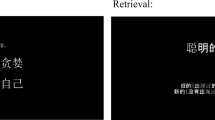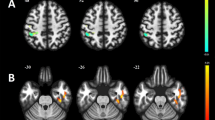Abstract
Cross-cultural psychological research suggests that self-construals can be dissimilar between individuals fostered in different cultures. Recent brain imaging studies concerned the underlying neural basis of cultural influences on cognitive processing of the self. In this chapter I first review cultural difference in self-concept and research concerning cultural influence on self-construals and related neural mechanisms. I then discuss the difference in self-construals between individuals with distinct religious belief and practice. Finally, I present brain imaging evidences that help to clarify distinct neurocognitive processes of the self induced by Christian belief, which is characterized with weakened neural coding of stimulus self-relatedness, but enhanced neural activity underlying evaluative process applied to self-referential stimuli.
Access this chapter
Tax calculation will be finalised at checkout
Purchases are for personal use only
Similar content being viewed by others
References
Azari N P, Nickel J, Wunderlich G, Niedeggen M, Hefter H, Tellmann L, Herzog H, Stoerig P, Birnbacher D, Seitz R J (2001) Neural correlates of religious experience. European Journal of Neuroscience 13:1649–1652
Banaji M R, Prentice D A (1994) The self in social contexts. Annual Review of Psychology 45:297–332
Beauregard M, Paquette V (2006) Neural correlates of a mystical experience in Carmelite nuns. Neuroscience Letters 405:186–190
Burns C (2003) “Soul-less” Christianity and the Buddhist empirical self: Buddhist- Christian Convergence? Buddhist-Christian Studies 23:87–100
Ching J (1984) Paradigms of the self in Buddhism and Christianity . Buddist-Shistian Studies 4:31–50
D’argembeau A, Collette F, Van der Linden M, Laureys S, Del Fiore G, Degueldre C, Luxen A, Salmon E (2005) Self-referential reflective activity and its relationship with rest: a PET study. Neuroimage 25:616–624
Fink G R, Markowitsch H J, Reinkemeier M, Bruckbauer T, Kessler J, Heiss W (1996) Cerebral representation of one’s own past: Neural networks involved in autobiographical memory. The Journal of Neuroscience 16:4275–4282
Fossati P, Hevenor S J, Graham S J, Grady C, Keightley M L, Craik F, Mayberg H (2003) In search of the emotional self: An fMRI study using positive and negative emotional words. American Journal Psychiatry 160: 1938–1945
Grèzes J, Frith C D, Passingham R E (2004) Inferring false beliefs from the actions of oneself and others: an fMRI study. Neuroimage 21:744–750
Gusnard D A, Akbudak E, Shulman G L, Raichle M E (2001) Medial prefrontal cortex and self-referential mental activity: Relation to a default mode of brain function. Proceedings of National Academy of Sciences USA 98:4259–4264
Han S, Mao L, Gu X, Zhu Y, Ge J, Ma Y (2008) Neural consequences of religious belief on self-referential processing. Social Neuroscience 3:1–15.
Heatherton T F, Wyland C L, Macrae C N, Demos K E, Denny B T, Keley W M (2006) Medial prefrontal activity differentiates self from close others. Social Cognitive Affective Neuroscience 1:18–25
James W (1890) Principles of psychology . Henry Holt, New York
Keenan J M, Baillet S D (1980) Memory for personally and significant events. In: Nickerson R S (ed) Attention and Performance. Lawrence Erlbaum Associates, New Jersey
Keenan J P, Gallup G G, Falk D (2003) The faced in the mirror: The search for the origins of consciousness. Harper Collins Publishers Inc, New York
Keenan J P, McCutcheon B, Freund S, Gallup G G, Sanders G, Pascal-Leone A (1999) Left hand advantage in a self-face recognition task. Neuropsychologia 37:1421–1425
Kelley W M, Macrae C N, Wyland C L, Caglar S, Inati S, Heatherton T F (2002) Finding the self? An event-related fMRI Study Journal of Cognitive Neuroscience 14:785–794
Lin H (2005) Religious wisdom of no-self. In: Wu Y, Lai P, Wang W (eds) Dialogue between Buddhisms and Christianity . Zhong Hua Book Company, Beijing
Macrae C N, Moran J M, Heatherton T F, Banfield J F, Kelley W M (2004) Medial prefrontal activity predicts memory for self. Cerebral Cortex 14:647–654
Markus H R, Kitayams S (2003) Culture self and the reality of the social. Psychological Inquiry 14:277–283
Markus H R, Kitayama S (1991) Culture and the self: implication for cognition emotion and motivation. Psychological Review 98:224–253
McDaniel J (1987) Self-affirmation and ego transcendence: The encounter of Christianity with feminism and Buddhism . Buddhist- Christian Studies 7:215–232
Mitchell J P, Banaji M R, Macrae C N (2005) General and specific contributions of the medial prefrontal cortex to knowledge about mental states. Neuroimage 28:757–762
Moran J M, Macrae C N, Heatherton T F, Wyland C L, Kelley W M (2006) Neuroanatomical evidence for distinct cognitive and affective components of self. Journal Cognitive Neuroscience 18:1586–1594
Northoff G, Heinzel A, de Greck M, Bermpohl F, Dobrowolny H, Panksepp J (2006) Self-referential processing in our brain --a meta-analysis of imaging studies on the self. Neuroimage 31:440–457
Oyserman D, Markus H R (1993) The sociocultural self. In: Suls J (ed) Psychological percpectives on the self. Lawrence Erlbaum Associates Publishers, Hillsdale New Jersey
Rogers T B, Kuiper N A, Kirker W S (1977) Self-reference and the encoding of personal information. Journal of Personality and Social Psychology 35:677–688
Sui J, Han S (2007) Self-construal priming modulates neural substrates of self-awareness. Psychological Science 18:861–866
Solomon R C (2002) The big questions: A short introduction to philosophy. Harcourt Bruce Collede Publishers, Orlando Florida
Spilka B, Hood R W, Hunsberger B, Gorsuch R (2003) The psychology of religion: An empirical approach. The Guilford Press, New York
Uddin L Q, Kaplan J T, Molnar-Szakaca I, Zaidel E, Iacoboni M (2005) Self-face recognition activates a frontoparietal “mirror” network in the right hemisphere: an event-related fMRI study. Neuroimage 25:926–935
Zhu Y, Zhang L (2002) An experimental study on the self-reference effect. Sciences in China (Series C) 45:120–128
Zhu Y, Zhang L, Fan J, Han S (2007) Neural basis of cultural influence on self representation. Neuroimage 34:310–1317
Zysset S, Huber O, Ferstl E, von Cramon D Y (2002) The anterior frontomedian cortex and evaluative judgment: an fMRI study. Neuroimage 15:983–991
Acknowledgments
This work was supported by National Natural Science Foundation of China (Project 30630025).
Author information
Authors and Affiliations
Corresponding author
Editor information
Editors and Affiliations
Rights and permissions
Copyright information
© 2009 Springer-Verlag Berlin Heidelberg
About this chapter
Cite this chapter
Han, S. (2009). Religious Belief and Neurocognitive Processes of the Self. In: Voland, E., Schiefenhövel, W. (eds) The Biological Evolution of Religious Mind and Behavior. The Frontiers Collection. Springer, Berlin, Heidelberg. https://doi.org/10.1007/978-3-642-00128-4_13
Download citation
DOI: https://doi.org/10.1007/978-3-642-00128-4_13
Published:
Publisher Name: Springer, Berlin, Heidelberg
Print ISBN: 978-3-642-00127-7
Online ISBN: 978-3-642-00128-4
eBook Packages: Biomedical and Life SciencesBiomedical and Life Sciences (R0)




